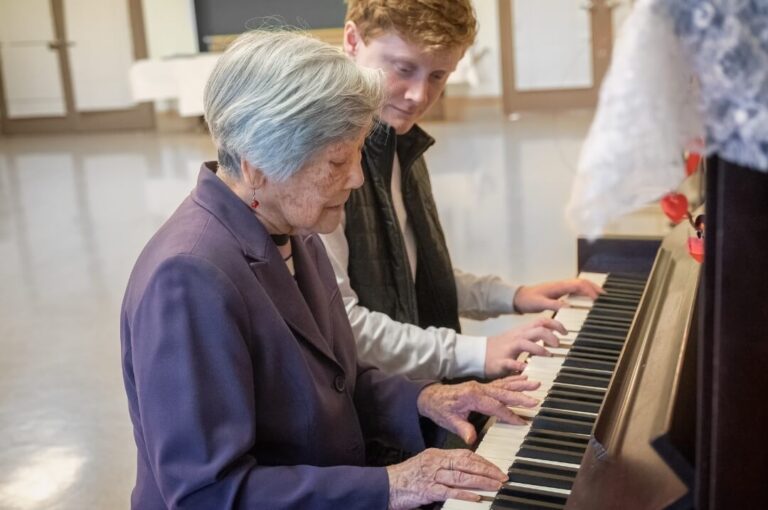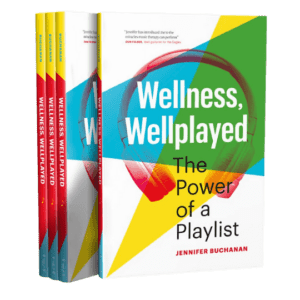Located in the heart of Calgary, Alberta, our community-focused private practice, JB Music Therapy, seeks to embody the genuine value of collaboration. Our journey has gently underscored a simple truth: true potential flourishes in unity, not in isolation. The future of music and music therapy in healthcare goes beyond just the ‘what’; it’s intricately tied to the ‘who’. It’s about nurturing partnerships that not only extend our reach but also foster meaningful, enduring change.


The Evolution of Partnerships in Music Therapy
In a recent spotlight session at the World Congress of Music Therapy, one of the presenters remarked, “what will be… is already happening in some form.” This statement resonated deeply with those of us who have navigated the challenges of establishing a private practice in a world before the digital age. The journey has been filled with trials, errors, and invaluable lessons on the importance of collaboration.
While the efficacy of music therapy is undeniable, challenges persist. From ensuring accessibility of music therapy services to all, to securing financial resources and maintaining our own well-being, the road ahead is complex. However, the solution lies in strengthening existing partnerships and strategically forging new ones. It’s about finding the right collaborators, the right ‘whos’, to journey with us. Here is what we know for sure:
- Diverse Teams Perform Better: McKinsey’s research has shown that companies with diverse top teams are top financial performers. In the realm of music therapy, diverse teams can lead to richer therapeutic experiences and innovative solutions.
- Shared Resources Lead to Greater Impact: Collaborative efforts often mean pooling resources. This can lead to comprehensive research, broader outreach, and impactful interventions, especially in the realm of music therapy.
- Trust is the Foundation of Every Partnership: In healthcare, where the stakes are high and the well-being of individuals is paramount, trust is essential. For music and music therapy, trust ensures that therapeutic interventions are received openly, collaborations are genuine, and the shared mission of healing and transformation is prioritized above all else.
Dreaming Big for Music Therapy
Imagine a world where every music therapist sees their dream realized?!?
For me, the future landscape of music therapy is best shaped by our present aspirations and the proactive steps we’re taking to bring those dreams to fruition.
Every professional in our field has dreams. Some aspire to develop standardized treatment protocols, while others envision leveraging technology in order to enhance patient care. There are those who are passionate about research, advocacy, and policy change. And then there are dreams that are deeply personal, like serving a specific population or ensuring a client reaches their desired outcomes.
No matter the scale or scope of your dreams, partnerships are undeniably pivotal to achieving success.


Real-Life Stories of Successful Partnerships in Music Therapy
- Partnership between Music Therapists and Hospitals: The integration of music therapy into traditional healthcare settings has been transformative. A prime example is the Louis Armstrong Center for Music and Medicine at Mount Sinai Beth Israel in New York City. This center stands as a testament to the profound impact of integrating music therapy into hospital care, enhancing patient well-being and recovery. Locally, JB Music Therapy has forged a strong collaboration with Alberta Health Services, working hand-in-hand with skilled medical teams. Together, we’ve extended music therapy’s reach to diverse units including ICU, Burns Units, Palliative Care, Neuro-rehabilitation, Forensics, and Long-term Care — amplifying the holistic care patients receive.
- Collaborations for Research: Research partnerships have been pivotal in validating and expanding the scope of music therapy. The collaboration between Nordoff-Robbins Music Therapy and renowned global universities has yielded groundbreaking research, underscoring the versatility and efficacy of music therapy across various therapeutic contexts. JB Music Therapy has also been at the forefront of such collaborative endeavors, partnering with researchers and institutions including the University of Calgary and the Mathison Centre under the leadership of Dr. Stephanie Plamondon. These collaborations have facilitated data collection and research, furthering the understanding and application of music therapy in mental health and rehabilitation settings.
- Music Therapy and Tech Companies: The fusion of music therapy with technology has opened new frontiers in therapeutic interventions. MedRhythms, through its collaboration with tech innovators, has pioneered digital therapeutics that leverage music to bolster neurological functions. This showcases the immense potential of interdisciplinary collaborations in enhancing therapeutic outcomes. JB Music Therapy, while traditionally focusing on high-touch interventions, has gracefully embraced technology. We’ve incorporated online sessions, integrated the use of our robot, Scout, and collaborated with large organizations to curate purposeful playlists. We have also created an assessment protocol to enhance the acoustic (sound, music) environments of corporate and healthcare settings.
10 Considerations for Building Impactful Partnerships
1. Define your Vision:
Clearly understand and articulate your vision and objectives. Engage in discussions, from close relatives to colleagues, to refine your vision and identify synergistic partnerships.
2. Cultivate Trust Through Transparency:
Value each partner’s contributions, openly discuss strengths and challenges. Engage in open dialogue, valuing both speaking and listening as essential tools for mutual understanding.
3. Harness Complementary Strengths:
Champion diversity, as it’s proven to enhance impact and revenue. Organize collaborative sessions to understand and leverage each partner’s unique strengths.
4. Jointly Define Goals and Assign Roles:
Collaboratively set shared objectives, ensuring clarity in roles and responsibilities for efficient teamwork.
5. Implement a Robust Communication Plan:
Utilize technology for efficient communication, establish shared document repositories, and proactively address potential disagreements or differing viewpoints.
6. Champion a Client-Centered Focus:
Prioritize patient well-being. In moments of uncertainty, let the needs and aspirations of the clients you serve guide your decisions.
7. Collaborate on Research and Advocacy:
Join forces on projects, studies, and publications to amplify the significance of music therapy in healthcare.
8. Prioritize Cultural Sensitivity:
Ensure the partnership respects and addresses the diverse cultural nuances of the communities you serve.
9. Continuously Evaluate and Adapt:
Set regular intervals for assessing the partnership’s efficacy, making necessary adjustments to align with evolving goals.
10. Acknowledge and Celebrate Milestones:
Maintain consistent communication, recognize achievements, and take moments to celebrate the partnership’s successes.
In the intricate tapestry of healthcare, partnerships emerge as the golden threads binding together diverse expertise, resources, and visions. They bridge gaps, foster innovation, and amplify impact, ensuring that care is not just delivered, but is holistic, client-centered, and forward-thinking. As we stand on the precipice of a new era in music and music therapy in healthcare, the power of partnerships remains our most potent tool. It reminds us that in unity, we find strength; in collaboration, we discover possibilities; and in shared purpose, we craft a brighter, healthier future for all.
As Helen Keller said one hundred years ago, “Alone we can do so little, together we can do so much.”
Let’s dream bigger, forge stronger partnerships, and together, continue to shape the future of the music therapy profession – our clients depend on it.











